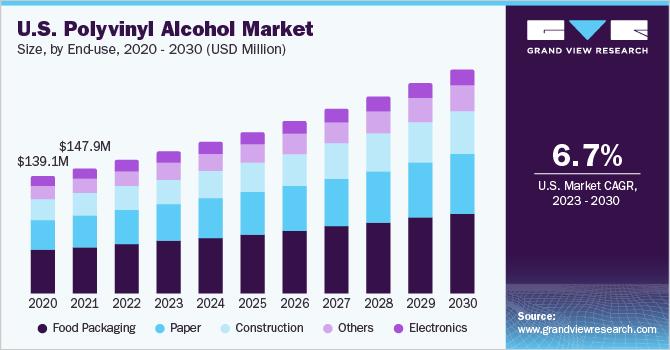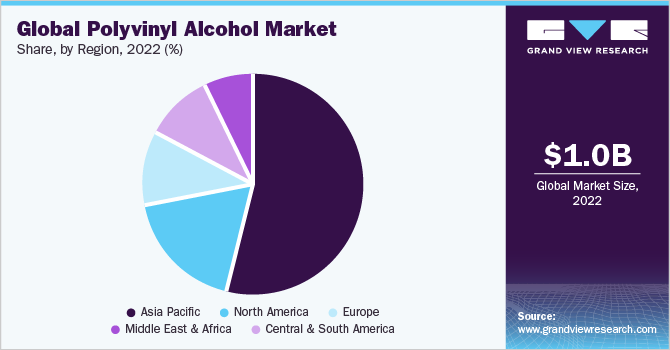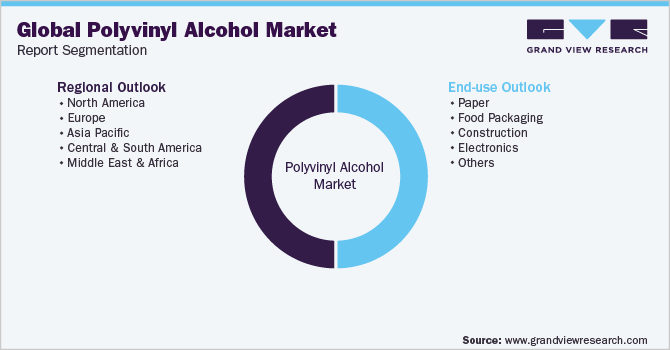- Home
- »
- Plastics, Polymers & Resins
- »
-
Polyvinyl Alcohol (PVA) Market Share & Growth Report, 2030GVR Report cover
![Polyvinyl Alcohol (PVA) Market Size, Share & Trends Report]()
Polyvinyl Alcohol (PVA) Market (2023 - 2030) Size, Share & Trends Analysis Report By End-use (Paper, Food Packaging, Construction, Electronics), By Region (North America, Europe, Asia Pacific), And Segment Forecasts
- Report ID: GVR-1-68038-837-4
- Number of Report Pages: 76
- Format: PDF
- Historical Range: 2018 - 2021
- Forecast Period: 2023 - 2030
- Industry: Bulk Chemicals
- Report Summary
- Table of Contents
- Segmentation
- Methodology
- Download FREE Sample
-
Download Sample Report
Polyvinyl Alcohol (PVA) Market Summary
The global polyvinyl alcohol (PVA) market size was estimated at USD 1,006.9 million in 2022 and is projected to reach USD 1,648.9 million by 2030, growing at a CAGR of 6.4% from 2023 to 2030. The increasing need for bio-based PVA products is expected to be a key factor driving the global industry growth over the forecast period.
Key Market Trends & Insights
- Asia Pacific led the global industry and accounted for a share of 53.6% of the overall revenue in 2022.
- In terms of volume, North America is expected to grow at a steady rate over the forecast period.
- Based on end use, the food packaging segment dominated the global industry in 2022 and accounted for the maximum share of 32.4% of the overall revenue (share).
- In terms of end use, construction is expected to have robust growth due to the rapid infrastructural development in China, India, and Japan.
Market Size & Forecast
- 2022 Market Size: USD 1,006.9 million
- 2030 Projected Market Size: USD 1,648.9 million
- CAGR (2023-2030): 6.4%
- Asia Pacific: Largest market in 2022
Polyvinyl alcohol, a synthetic water-soluble polymer, has been the key ingredient used in the formulation process in various end-use industries. The key end-use industries include food packaging, construction, electronics, coatings, printing, textile, cosmetics, and paper. PVA is mainly driven by the demand from the food packaging industry, as it is a material with better water solubility and biodegradable properties.

The sustainable packaging of the products is in high demand, owing to stringent regulations for its disposal and declining landfill availability. The demand for packaging in various applications is fueled by several factors, such as the expansion of the consumer base, increase in cost per package, and sustainability in the major markets, such as the U.S., China, and India. The development of various biodegradable packaging materials has garnered attention in the recent past. Renewable natural polymers have been tested to enhance the biodegradation potential of PVA-based end-use products. Among the different biodegradable synthetic polymers, PVA material is extensively used owing to its biodegradability in various microbial environments. PVA has different applications, such as ceramic, textile, coatings, paper, and wood.
The various grades are useful for different end-use industries. In addition, similar grades of the product can also be used for various end-uses. This ability has augmented the product demand over the last few years. There are lesser-known substitutes available for PVA on account of its properties including ethanol and water solubility, coupled with resistance to grease and oil. However, stringent regulations hindered product usage in various application segments. The National Institute for Occupational Safety and Health (NIOSH) described several preventive and environmental safety measures after PVA exposure. The generation of solid waste can affect human health, especially children, who are more susceptible to these hazardous pollutants.
End-use Insights
On the basis of end-uses, the industry has been further categorized into food packaging, paper, construction, electronics, and others. The food packaging segment dominated the global industry in 2022 and accounted for the maximum share of 32.4% of the overall revenue share. The increasing need for biocompatible and nontoxic packaging solutions in the food & beverage industry is expected to drive the industry growth. Thin and water-resistant food-grade PVA film is developed that prevents moisture formation.
Advantageous properties, such as good crosslinking density and moisture resistance, are expected to further fuel the growth of the market in this segment. In addition, PVA is also extensively used in the construction industry on account of its properties, such as better water solubility and particle size, adsorption capacity, cement pore solution viscosity, and static filtration of cement slurries. Construction is a diverse market that is expected to have robust growth due to the rapid infrastructural development in the region, especially in China, India, and Japan.
Regional Insights
On the basis of geographies, the industry has been further segmented into Asia Pacific, North America, Europe, MEA, and Central & South America. Asia Pacific led the global industry and accounted for a share of 53.6% of the overall revenue in 2022. This trend is expected to continue over the forecast period. It is projected to register the fastest CAGR from 2023 to 2030. Increasing demand for PVA from various end-use sectors mainly, paper, is expected to propel the segment growth over the forecast period.

Asia Pacific was followed by North America, in terms of volume, and is expected to grow at a steady growth rate over the forecast period. The rising solid waste volumes in this region are projected to fuel the demand for PVA in packaging applications over the forecast period. In addition, rising innovation in packaging, and consumer demand for safety, convenience, technology, and sustainability, are expected to fuel the regional market growth over the forecast period.
Key Companies & Market Share Insights
The global industry is highly competitive due to the presence of several well-established companies. These companies are emphasizing new product development, partnerships, and acquisitions with key players to increase their share and strengthen their competitive aspect. Some of the key players in the global polyvinyl alcohol market include:
-
E. I. du Pont de Nemours and Company
-
Nippon Synthetic Chemical Industry Co.
-
Eastman Chemical Company
-
Sekisui Chemical Co. Ltd.
-
Kuraray Co. Ltd.
-
Sinopec Sichuan Vinylon
-
Anhui Wanwei Group Co., Ltd.
Polyvinyl Alcohol Market Report Scope
Report Attribute
Details
Market size value in 2023
USD 1,069.4 million
Revenue forecast in 2030
USD 1,648.9 million
Growth rate
CAGR of 6.4% from 2023 to 2030
Base year for estimation
2022
Historical data
2018 - 2021
Forecast period
2023 - 2030
Quantitative units
Volume in kilotons, revenue in USD million/billion, and CAGR from 2023 to 2030
Report coverage
Revenue forecast, volume forecast, competitive landscape, growth factors, and trends
Segments covered
End-use, region
Regional scope
North America; Europe; Asia Pacific; Central & South America; Middle East & Africa
Country scope
U.S.; Germany; U.K.; China; Japan; Brazil
Key companies profiled
E. I. du Pont de Nemours and Company; Nippon Synthetic Chemical Industry Co.; Eastman Chemical Company; Sekisui Chemical Co. Ltd.; Kuraray Co. Ltd.; Sinopec Sichuan Vinylon; Anhui Wanwei Group Co., Ltd.
Customization scope
Free report customization (equivalent up to 8 analysts working days) with purchase. Addition or alteration to country, regional, and segment scope
Pricing and purchase options
Avail customized purchase options to meet your exact research needs. Explore purchase options
Global Polyvinyl Alcohol (PVA) Market Report Segmentation
This report forecasts revenue growth at global, regional, and country levels and provides an analysis of the latest industry trends in each of the sub-segments from 2018 to 2030. For the purpose of this study, Grand View Research has segmented the global polyvinyl alcohol market report on the basis of end-use and region:

-
End-use Outlook (Volume, Kilotons; Revenue, USD Million, 2018 - 2030)
-
Paper
-
Food Packaging
-
Construction
-
Electronics
-
Others
-
-
Regional Outlook (Volume, Kilotons; Revenue, USD Million, 2018 - 2030)
-
North America
-
U.S.
-
-
Europe
-
Germany
-
U.K.
-
-
Asia Pacific
-
China
-
Japan
-
-
Central & South America
-
Brazil
-
-
Middle East & Africa
-
Frequently Asked Questions About This Report
b. The global polyvinyl alcohol market size was estimated at USD 1,006.9 million in 2022 and is expected to reach USD 1,069.4 million in 2023.
b. The global polyvinyl alcohol market is expected to grow at a compound annual growth rate of 6.4% from 2023 to 2030 to reach USD 1,648.9 million by 2030.
b. The food packaging segment dominated the polyvinyl alcohol market with a revenue share of over 32.0% in 2022. This is attributed to the increasing need for biocompatible and nontoxic packaging solutions in the food and beverage industry.
b. Some key players operating in the polyvinyl alcohol market include DuPont, Nippon Synthetic Chemical Industry Co., Eastman Chemical Company, Sekisui Chemical Co. Ltd., Kuraray Co. Ltd., Sinopec Sichuan Vinylon, and Anhui Wanwei Group Co., Ltd.
b. Rising demand for sustainable packaging, and presence of strength regulation regarding non-degradable packaging material is anticipated to boost the demand of polyvinyl alcohol market over the forecast period.
Share this report with your colleague or friend.
Need a Tailored Report?
Customize this report to your needs — add regions, segments, or data points, with 20% free customization.

ISO 9001:2015 & 27001:2022 Certified
We are GDPR and CCPA compliant! Your transaction & personal information is safe and secure. For more details, please read our privacy policy.
Trusted market insights - try a free sample
See how our reports are structured and why industry leaders rely on Grand View Research. Get a free sample or ask us to tailor this report to your needs.










